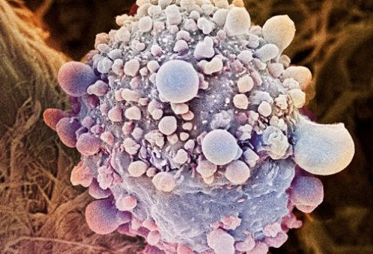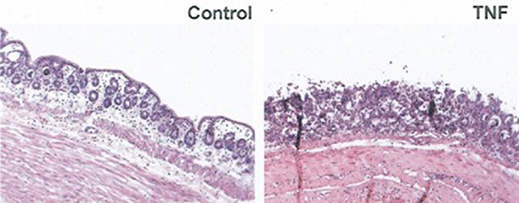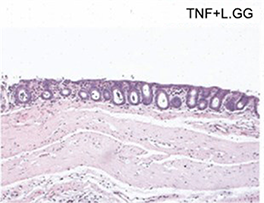|

Doctors have made use of GG probiotic's protective effect on the intestine to reduce the side-effects of: Chemotherapy Radiotherapy Cancer patients usually undergo chemotherapy or radiotherapy as part of their treatment programme. These forms of treatment are meant to destroy cancer cells but very often, they destroy normal cells too. One of the most vulnerable organs which is frequently damaged by these forms of therapy is the gastrointestinal tract. LACTOGG®’s probiotic strain can induce growth and repair of the cells of the intestinal surface. Research groups in the US and Canada have demonstrated that this specific probiotic bacterium produces protein substances which reduce inflammation and intestinal cell damage. 
Addition of Lactobacillus GG prevented intestinal cell damage.
A = normal cells, B = cells damaged by inflammation, C = addition of Lactobacillus GG prevents damage by inflammation. Arrows indicate areas when cell walls were destroyed. [Donato et al. 2010]  
Sections of a mouse large intestine showing widespread damage to the intestine when exposed to inflammation factors (TNF). Note minimal disruption of the intestinal surface when Lactobacillus GG was added.
Control = Normal intestine, TNF = Addition of inflammation factors, TNF+L. GG = Addition of inflammation factors and Lactobacillus GG [Yan et al. 2007] How should LACTOGG® be taken? Supplement amount: At least 1 sachet or 1 capsule a day. Since chemotherapy and radiotherapy actively destroy all living cells, it is advisable to increase the number of capsules and the frequency of doses in order to ensure enough live GG probiotic remain to stimulate the immune system and rebuild the intestinal surface. Eg. Patients may take 2-3 capsules 2-3 times a day during active therapy. There is no "overdosing" of LACTOGG®. For best results, LACTOGG® should be commenced before the start of cancer treatment and continued throughout the course of treatment and maintained after completion of treatment to regenerate the intestinal surface barrier. References: Donato KA et al. Lactobacillus rhamnosus GG attenuates interferon-ɣ and tumor necrosis factor-ɑ-induced barrier dysfunction and pro-inflammatory signalling. Microbiology 2010, 156, 3288–3297 Dong MY et al. Effects of feeding Lactobacillus GG on lethal irradiation in mice. Diagn Microbiol Infect Dis 1987;7:1-7 Kandasamy M et al. Lactobacilli secreting a tumor antigen and IL15 activates neutrophils and dendritic cells and generates cytotoxic T lymphocytes against cancer cells. Cell Immunol 2011;271(1):89-96 Goldin et al. The effect of Lactobacillus GG on the initiation and promotion of DMH-induced intestinal tumors in the rat. Nutr Cancer 1996; 25:197-204 Greenville C. Gut microbiota - Anti-cancer therapies affected by gut microbiota. Nat Rev Gastroenterol Hepatol. 2014 Jan;11(1):1 Rafter J et al. Dietary synbiotics reduce cancer risk factors in polypectomized and colon cancer patients. Am J Clin Nutr 2007;85:488-96 Wollowski I et al. Protective role of probiotics and prebiotics in colon cancer. Am J Clin Nutr 2001;73(Suppl):451S-455S Yan F et al. Soluble proteins produced by probiotic bacteria regulate intestinal epithelial cell survival and growth. Gastroenterology 2007;132:562-75 |




